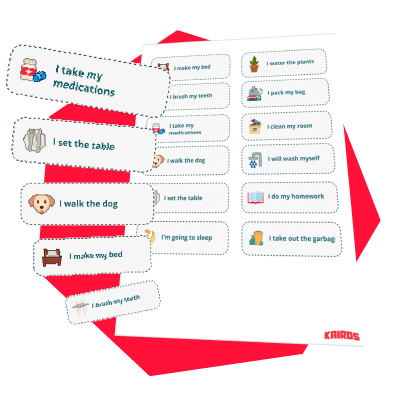Helping your child develop social skills: A guide for parents of children with ADHD
Children with ADHD often face unique challenges in social situations. They may struggle with impulsivity, attention, and hyperactivity, making it difficult for them to interact effectively with peers. Developing strong social skills is crucial for their emotional well-being and future success. This guide provides practical strategies to help your child navigate social interactions and build meaningful relationships.
1. Understand the social challenges of ADHD
Before you can help your child improve their social skills, it's important to understand the specific challenges they face. Children with ADHD might:
- Interrupt conversations frequently
- Struggle to follow social cues
- Have difficulty waiting their turn
- Exhibit impulsive behavior
- Experience frustration or anxiety in social settings
By recognizing these challenges, you can tailor your approach to meet your child's needs effectively.
2. Model positive social behavior
Children often learn by observing the adults around them. As a parent, you can serve as a powerful role model for positive social behavior.
Demonstrate Good Communication: Show your child how to engage in conversations by maintaining eye contact, listening actively, and responding thoughtfully. Use everyday interactions as teaching moments.
Practice Empathy: Teach your child to understand and respect others' feelings. Use role-playing games to demonstrate how to respond empathetically in various situations. For example, you can act out a scenario where someone feels left out and discuss how to make them feel included.
Use Real-Life Examples: Point out examples of good social behavior in books, movies, or real-life situations. Discuss why these behaviors are effective and how your child can incorporate them into their own interactions.
3. Create opportunities for social interaction
Providing your child with regular opportunities to practice their social skills is essential. Choose activities that align with their interests and strengths to make the experience enjoyable.
Organize Playdates: Arrange playdates with a small group of peers in a controlled environment. This allows your child to practice social interactions in a familiar setting. Supervise the playdates initially and gradually give your child more independence as they become more comfortable.
Enroll in Group Activities: Encourage your child to join clubs, sports teams, or other group activities that interest them. Participating in these activities helps them learn teamwork, cooperation, and communication skills.
Host Family Gatherings: Regular family gatherings provide a safe space for your child to interact with relatives. Use these opportunities to practice social skills in a supportive environment.
4. Teach and reinforce social skills
Explicitly teaching social skills can help your child understand what is expected of them in different situations.
Use Social Stories: Social stories are short, descriptive narratives that explain social situations and appropriate responses. They can help your child understand what to expect and how to behave in various scenarios. Create social stories tailored to your child's experiences and review them together regularly.
Practice Role-Playing: Role-playing is an effective way to practice social interactions. Act out common social situations with your child, such as introducing themselves, joining a group activity, or handling conflicts. Provide positive feedback and gentle correction as needed.
Reinforce Positive Behavior: Recognize and praise your child when they demonstrate good social behavior. Positive reinforcement can motivate them to continue practicing these skills. Consider using a reward system where your child earns points or small rewards for positive social interactions.
5. Manage impulsivity and hyperactivity
Impulsivity and hyperactivity can hinder social interactions for children with ADHD. Implementing strategies to manage these behaviors can improve their social experiences.
Use visuals and pictograms : Visual schedules can help your child understand the structure of their day and reduce anxiety about transitions. Clearly outline the day's activities and include social interactions. This preparation can help them feel more in control and less impulsive. Try Kairos and see how it can support you as a parent and your child.
Practice Mindfulness: Mindfulness exercises can help your child develop self-awareness and self-control. Simple practices like deep breathing, guided imagery, or yoga can be beneficial. Incorporate these exercises into your daily routine to help your child manage their impulsivity.
Teach Self-Regulation Techniques: Teach your child techniques to manage their impulses and stay calm. For example, counting to ten before responding, taking deep breaths, or using a stress ball can help them control their impulses in social situations.
6. Build a supportive network
Surrounding your child with a supportive network of family, friends, and professionals can make a significant difference in their social development.
Communicate with Teachers: Maintain open communication with your child's teachers and school staff. They can provide valuable insights into your child's social interactions at school and collaborate with you to support their social development.
Seek Professional Help: Consider seeking the help of a therapist or counselor who specializes in working with children with ADHD. They can provide targeted strategies and support for improving social skills.
Join Support Groups: Connect with other parents of children with ADHD through support groups or online communities. Sharing experiences and advice can be incredibly helpful and reassuring.
Conclusion
Developing social skills is a crucial part of your child's growth and well-being, especially for children with ADHD. By understanding their unique challenges, modeling positive behavior, creating opportunities for social interaction, explicitly teaching social skills, managing impulsivity, and building a supportive network, you can help your child navigate social situations more effectively. With patience, practice, and support, your child can build meaningful relationships and thrive socially.
